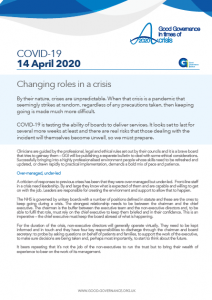Changing roles in a crisis
14 April 2020

By their nature, crises are unpredictable. When that crisis is a pandemic that seemingly strikes at random, regardless of any precautions taken, then keeping going is made much more difficult.
COVID-19 is testing the ability of boards to deliver services. It looks set to last for several more weeks at least and there are real risks that those dealing with the incident will themselves become unwell, so we must prepare.
Clinicians are guided by the professional, legal and ethical rules set out by their councils and it is a brave board that tries to gainsay them – GGI will be publishing a separate bulletin to deal with some ethical considerations. Successfully bringing into a highly professionalised environment people whose skills need to be refreshed and updated, or drawn rapidly to practical implementation, demands a bold mix of pace and patience.
Over-managed, under-led
A criticism of responses to previous crises has been that they were over-managed but under-led. Front-line staff in a crisis need leadership. By and large they know what is expected of them and are capable and willing to get on with the job. Leaders are responsible for creating the environment and support to allow that to happen.
The NHS is governed by unitary boards with a number of positions defined in statute and these are the ones to keep going during a crisis. The strongest relationship needs to be between the chairman and the chief executive. The chairman is the buffer between the executive team and the non-executive directors and, to be able to fulfil that role, must rely on the chief executive to keep them briefed and in their confidence. This is an imperative – the chief executive must keep the board abreast of what is happening.
For the duration of the crisis, non-executive directors will generally operate virtually. They need to be kept informed and in touch and they have four key responsibilities to discharge through the chairman and board secretary: to probe by asking questions on behalf of patients and families, to support the work of the executive, to make sure decisions are being taken and, perhaps most importantly, to start to think about the future.
It bears repeating that it’s not the job of the non-executives to run the trust but to bring their wealth of experience to bear on the work of its management.
The rest of the C-suite
The remaining members of the statutory C-suite are the chief nurse, chief medical officer and the chief finance officer. Each should have a nominated deputy, as should the chief executive. Many trusts will be relying on a gold-cell arrangement to manage the operational aspects of this crisis and this is perhaps the most effective way of ensuring that the team is broad enough to spread the load and be able to cope if there are unavoidable absences.
Inevitably there will be moments of chaos and uncertainty – the role of the top of the office is to make choices, provide resources and support. NHS staff are used to operating within their trust’s guiding values and principles and these are even more important when dealing with COVID-19.
Aside from treating COVID-19 patients, leaders will need a clear understanding of what else the trust should be doing. Emergency, cancer and other vital, life-saving procedures will have to continue and be planned for. Support teams will be even busier keeping the trust clean and maintained and the portering efficient; managing recruitment, on-boarding, training and rostering; and keeping the procurement function working effectively – there will be some deployment flexibility possible with some roles.
All-important people factors
Keeping a grip of people factors during a crisis is essential if staff are to feel empowered to focus on goals and outcomes, that they can contribute and that their contribution is appreciated. After patient safety and quality of care, staff well-being is the most important priority for the board. Basics such as making sure staff eat and can feed their families, pay their bills and so on are overwhelmingly important – and being kind to one another is something all can do.
As well as coping with the current situation, markers for the future – of the new normal – will emerge over the coming weeks. Embracing the transformation and making sure that the rapid implementation of new practices isn’t instantly lost as the pandemic loosens its grip will become a key responsibility for leaders, encouraged by non-executive directors.
Running through all of this is the need to communicate effectively and truthfully. Targeting the audience so that messages land appropriately so there are no surprises and people understand what is being done and why. Then, as the end comes into view, looking back and learning from the experience is particularly important given the warnings of second and third waves of the virus in the absence of an effective vaccine.
The GGI ABC
This can all be summarised in a Good Governance Institute ABC:
Accept and embrace the exceptional situation
Build an understanding amongst staff of what you are expecting from them
Communicate to inform, reassure and position for the future
Do what you’ve planned with constant focus on “events” that you may need to react to
Evaluate what happened to learn and adapt as we create a new normal.
Changing roles in a COVID-19 crisis could well presage changing roles in the new normal – we have to get used to it.
If this update prompts any thoughts or questions – or you would like to find out about how GGI can help your organisation during the coronavirus crisis – we would love to hear from you. Please call us on 07732 681120 or email advice@good-governance.org.uk. We will do our best to reply within 24 hours.

